(House of bhakti) – Meeting is higher than Separation
The following is a transcription of a discourse delivered by Śrīla Bhaktivedānta Nārāyaṇa Mahārāja in Hilo, Hawaii, on January 13, 2003.
Śrīpāda Padmanābha Mahārāja: There is another topic that requires proper reconciliation and correct 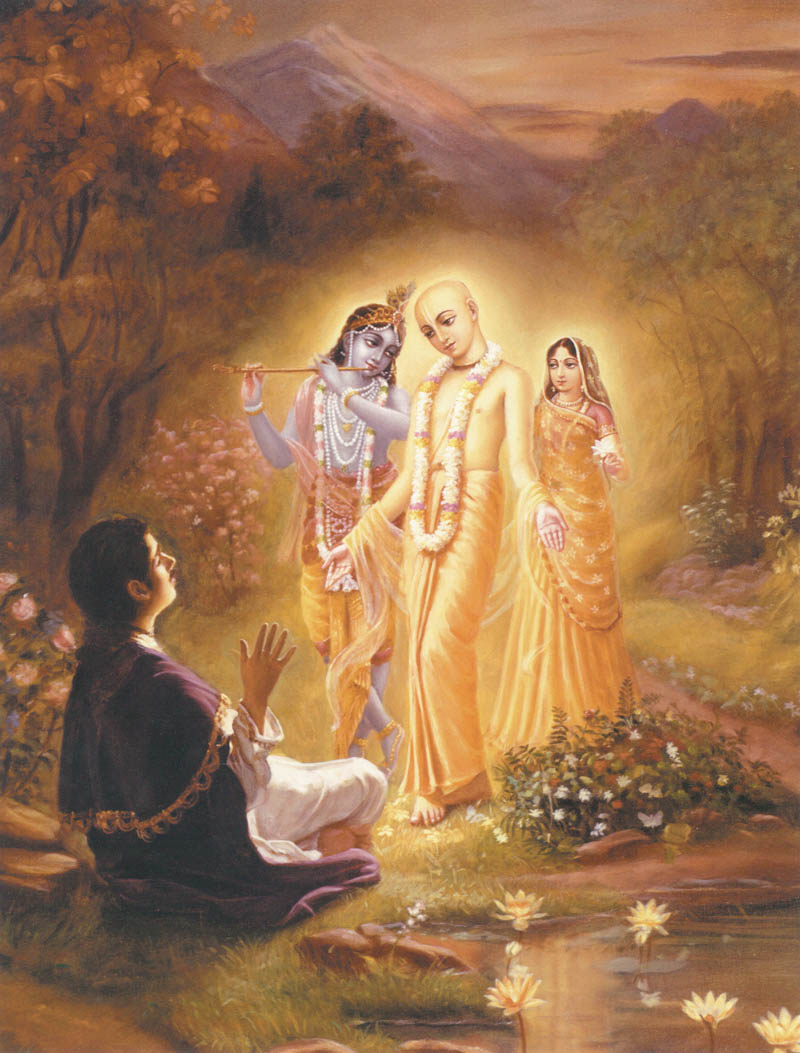 understanding. Certain persons have written a paper in which they suggest that there is a difference of opinion between Śrīla Prabhupāda Bhaktivedānta Svāmī Mahārāja and Śrīla Bhaktivedānta Nārāyaṇa Mahārāja, regarding the relative spiritual exaltation in the moods of separation and meeting in conjugal love. These persons give a quotation from Śrīla Prabhupāda’s book, Teachings of Lord Caitanya, from the conversation between Śrī Caitanya Mahāprabhu and Śrī Rāmānanda Rāya.
understanding. Certain persons have written a paper in which they suggest that there is a difference of opinion between Śrīla Prabhupāda Bhaktivedānta Svāmī Mahārāja and Śrīla Bhaktivedānta Nārāyaṇa Mahārāja, regarding the relative spiritual exaltation in the moods of separation and meeting in conjugal love. These persons give a quotation from Śrīla Prabhupāda’s book, Teachings of Lord Caitanya, from the conversation between Śrī Caitanya Mahāprabhu and Śrī Rāmānanda Rāya.
I am reading Śrīla Prabhupāda’s first quote, as presented in the above-mentioned paper: “Upon hearing of these transcendental activities, Lord Caitanya said, ‘O My dear Rāmānanda, what you have explained regarding the transcendental pastimes of Śrī Rādhā and Kṛṣṇa is perfectly correct. Yet there is something more I would like to hear from you.’ ‘It is very difficult for me to express anything beyond this,’ Rāmānanda Rāya replied to Caitanya Mahāprabhu, ‘but I can say only that there is an emotional activity called prema-vilāsa-vivarta, which I may try to explain. But I don’t know whether you would be happy to hear it.’”
The authors of the paper then quote Śrīla Prabhupāda’s short comment there: “In prema-vilāsa there are two kinds of emotional activities — separation and meeting. That transcendental separation is so acute that it is actually more ecstatic than meeting.” With this quotation the paper has attempted to assert that Śrīla Prabhupāda is saying that separation (vipralambha) is on a higher level and brings more ecstasy than the meeting (sambhoga) between Rādhā and Kṛṣṇa.*[See Endnote 1]
The paper then presents the idea that Śrīla Bhaktivedānta Nārāyaṇa Mahārāja has said the opposite and that he is incorrect. I am now reading their quotations from an English translation of Śrīla Bhaktivedānta Nārāyaṇa Mahārāja’s Hindi talks during Vraja-maṇḍala Parikramā: “Those who have not scrutinizingly studied the scripture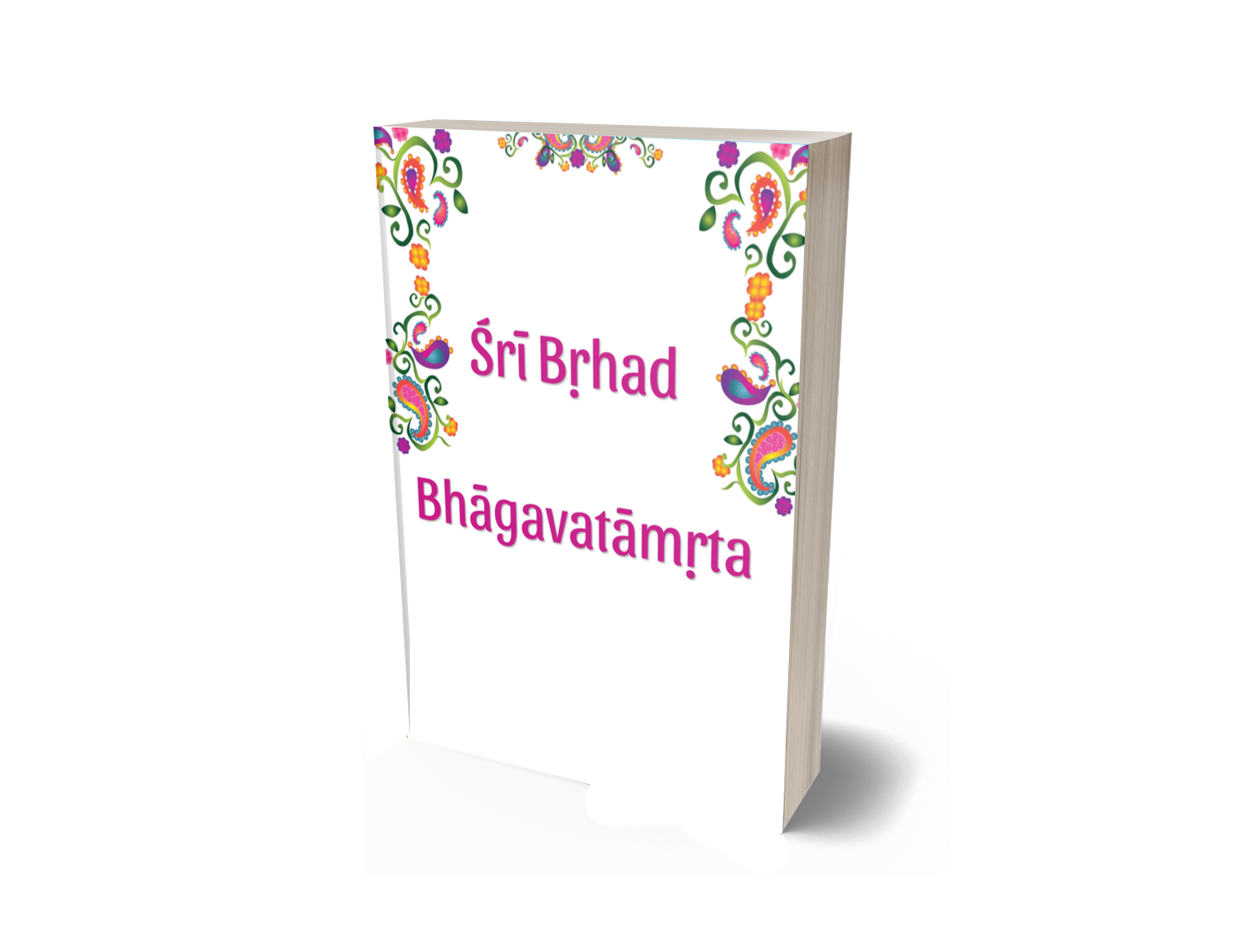 Śrīmad-Bhāgavatam, and who have not conscientiously comprehended Śrī Caitanya-caritāmṛta, and who have not properly understood books like Bhakti-rasāmṛta-sindhu, Bṛhad-bhāgavatāmṛta, Ujjvala-nīlamaṇi, Kṛṣṇa-karnamṛta and other literatures of this nature, consider vipralambha, the mood of separation, to be the highest level of ecstasy. Our previous ācāryas have also considered vipralambha to be an exalted state, but after much reflection they perceived vipralambha as a pre-requisite to highlight and more fully embellish and amplify the ecstasy of reunion. If there would be only vipralambha for all of eternity, what would be its use? What would be its service? Vipralambha is necessary only because it intensifies the ecstatic feelings of reunion.”
Śrīmad-Bhāgavatam, and who have not conscientiously comprehended Śrī Caitanya-caritāmṛta, and who have not properly understood books like Bhakti-rasāmṛta-sindhu, Bṛhad-bhāgavatāmṛta, Ujjvala-nīlamaṇi, Kṛṣṇa-karnamṛta and other literatures of this nature, consider vipralambha, the mood of separation, to be the highest level of ecstasy. Our previous ācāryas have also considered vipralambha to be an exalted state, but after much reflection they perceived vipralambha as a pre-requisite to highlight and more fully embellish and amplify the ecstasy of reunion. If there would be only vipralambha for all of eternity, what would be its use? What would be its service? Vipralambha is necessary only because it intensifies the ecstatic feelings of reunion.”
That is one quotation. Then the paper quoted one more short statement from Śrīla Bhaktivedānta Nārāyaṇa Mahārāja’s Vraja-maṇḍala Parikramā book: “So you can see that the mood of vipralambha is much more complex than the way you envisioned it before. Those who persist in advocating that vipralambha is the highest do not yet have the spiritual maturity and understanding to realize that it is not possible for anything to be more elevated than Śrīmatī Rādhārāṇī and Kṛṣṇa’s ecstatic loving exchanges in reuniting (sambhoga).”
Does everyone understand clearly?
Śrīla Bhaktivedānta Nārāyaṇa Mahārāja: I have clarified this topic in the above-mentioned quotes. Separation is only needed because it serves to increase the enjoyment of meeting; it helps in that. Still, I want to explain this further:
Śrīla Viśvanātha Cakravartī Ṭhākura has written that in mādanākhya-mahābhāva (the highest limit of love for Kṛṣṇa) there is the experience of the greatest intensity of separation in meeting and meeting in separation. All moods, in their extreme exaltation, are present in Śrīmatī Rādhikā in her mādanākhya-mahābhāva.
Kṛṣṇa also reveals Himself, in intense separation (divyā-viraha). In that mood of separation the gopīs are fully absorbed in Kṛṣṇa, in all His qualities and all His pastimes. Yet, at the same time, they want to embrace Kṛṣṇa right then and there. They do not want to burn in the fire of separation.
The gopīs are not satisfied in their mood of separation; they cannot be satisfied. Their desire is this: ‘Kṛṣṇa should come directly in front of us, face to face so that He can put His very soft and gentle lotus feet on our breasts.’ They lament that because their breasts are very hard, they must place His lotus feet there with the utmost gentle care. To whose lotus feet are they referring? The lotus feet of that Kṛṣṇa, which even Brahmā, Śrī Nārada Ṛṣi, Śrī Śukadeva Gosvāmī and Śrī Bhīṣmadeva cannot bring in their trance of meditation. It is those feet that the gopīs want to place on their breasts.
yat te sujāta-caraṇāmburuhaṁ staneṣu
bhītāḥ śanaiḥ priya dadhīmahi karkaśeṣu
tenāṭavīm aṭasi tad vyathate na kiṁ svit
kūrpādibhir bhramati dhīr bhavad-āyuṣāṁ naḥ
(Śrīmad-Bhāgavatam 10.31.19)
[“O dearly beloved! Your lotus feet are so soft that we place them gently on our breasts, fearing that Your feet will be hurt. Our life rests only in You. Our minds, therefore, are filled with anxiety that Your tender feet might be wounded by pebbles as You roam about on the forest path.”]
The gopīs lament in this connection, ‘Oh, what shall we do? Kṛṣṇa likes that His feet are placed on our breasts, but we are afraid we are hurting Him.’ The gopīs don’t want to meditate on Kṛṣṇa. They desire this: ‘Kṛṣṇa should come out from within our hearts so that we can embrace Him. Only in this way will our fire of separation be extinguished.’
Some persons say that vipralambha is higher than sambhoga. Only a neutral person can say this. Neutral 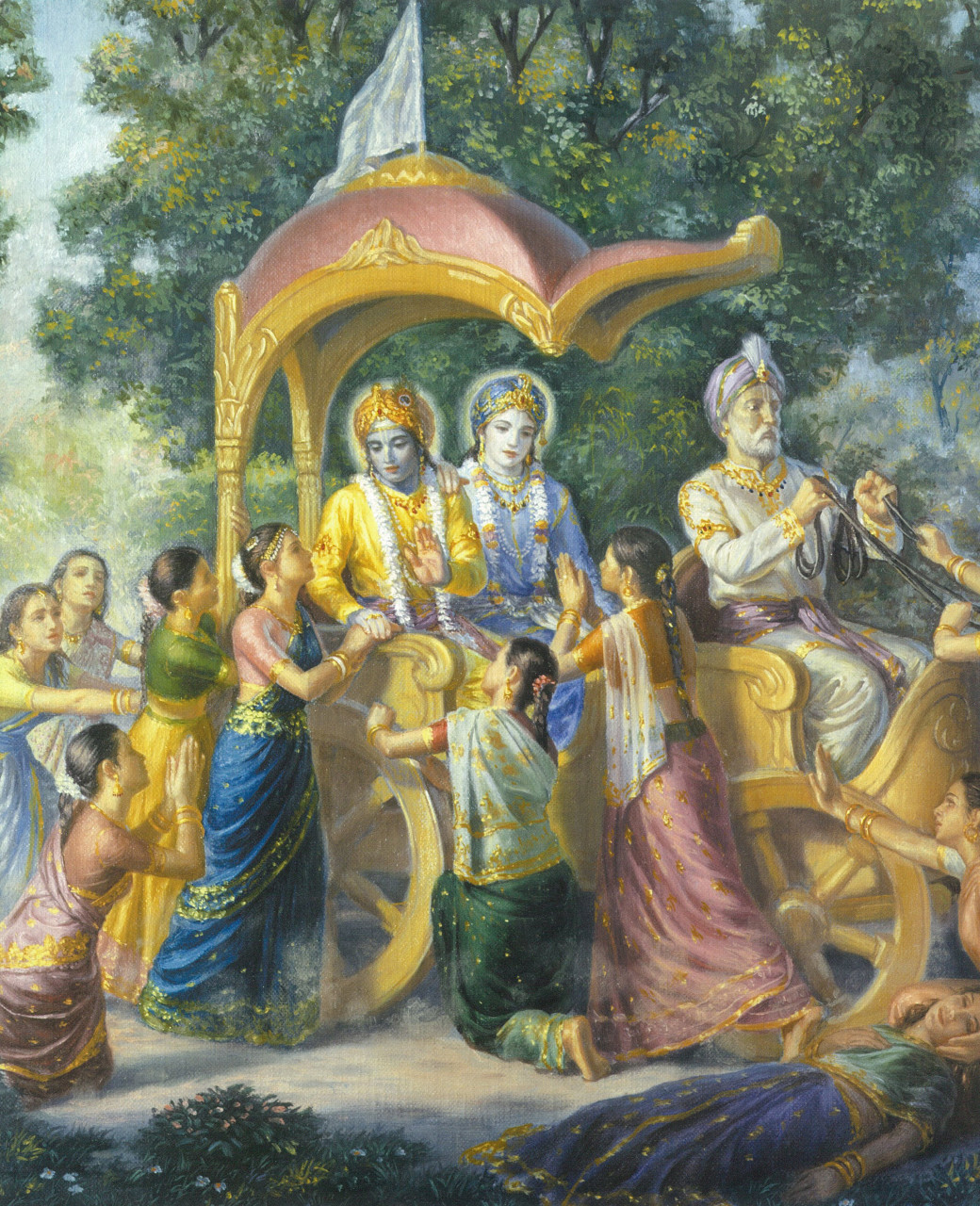 persons alone can say that it is good if the gopīs only see Kṛṣṇa in their trance. Such persons can say that although the gopīs want to embrace Kṛṣṇa, it is better if Kṛṣṇa’s association comes to them by their mood of separation. It is better that they always meet Him in their mood of separation, as they close their eyes and remember Him in their hearts. Such neutral persons think that the gopīs’ separation is very good, and such persons are like Akrūra and Kaṁsa, who have no desire for the meeting of Rādhā and Kṛṣṇa. Akrūra can say, ‘Take Kṛṣṇa from Vraja. Let the Vrajavāsīs feel separation; they should be always feeling separation.’ And Kaṁsa will be very happy to say, ‘Bring Kṛṣṇa here to Mathurā, and I will kill Him there.’
persons alone can say that it is good if the gopīs only see Kṛṣṇa in their trance. Such persons can say that although the gopīs want to embrace Kṛṣṇa, it is better if Kṛṣṇa’s association comes to them by their mood of separation. It is better that they always meet Him in their mood of separation, as they close their eyes and remember Him in their hearts. Such neutral persons think that the gopīs’ separation is very good, and such persons are like Akrūra and Kaṁsa, who have no desire for the meeting of Rādhā and Kṛṣṇa. Akrūra can say, ‘Take Kṛṣṇa from Vraja. Let the Vrajavāsīs feel separation; they should be always feeling separation.’ And Kaṁsa will be very happy to say, ‘Bring Kṛṣṇa here to Mathurā, and I will kill Him there.’
These two persons can speak in this way, but no Vrajavāsī wants Kṛṣṇa to be separated from Vraja. Not even a plant, creeper, or bird of Vṛndāvana wants Kṛṣṇa to leave Vraja. No one there wants the Vrajavāsīs to feel separation. None of them think, ‘Separation is so high.’ And what to speak of the gopīs? What to speak of Lalitā and Viśākhā, and Rūpa Mañjarī and Rati Mañjarī?
Those who are confidential servants of Śrīmatī Rādhikā, and who have more affection for Her than for Kṛṣṇa, never desire Her separation from Kṛṣṇa. In fact, Vrajavāsīs like Lalitā and Viśākhā, and pālya-dāsīs like Rūpa Mañjarī, Rati Mañjarī and Kamala Mañjarī, cannot tolerate the separation of Rādhikā from Kṛṣṇa at all. Do you know who is Kamala Mañjarī? In her sādhaka form she (he) is Śrīla Bhaktivinoda Ṭhākura.
In his song, Śrī Kṛṣṇa Virahe, Śrīla Bhaktivinoda Ṭhākura writes: ‘I cannot bear to see the feelings of separation of Rādhikā’.
śrī kṛṣṇa-virahe, rādhikāra daśā, āmi tô’ sahite nāri
ĵugala-milana, sukhera kāraṇa, jīvana chāḓite pāri (1)
[“I cannot tolerate Rādhikā’s condition in separation from Śrī Kṛṣṇa. Thus I am fully prepared to give up my life 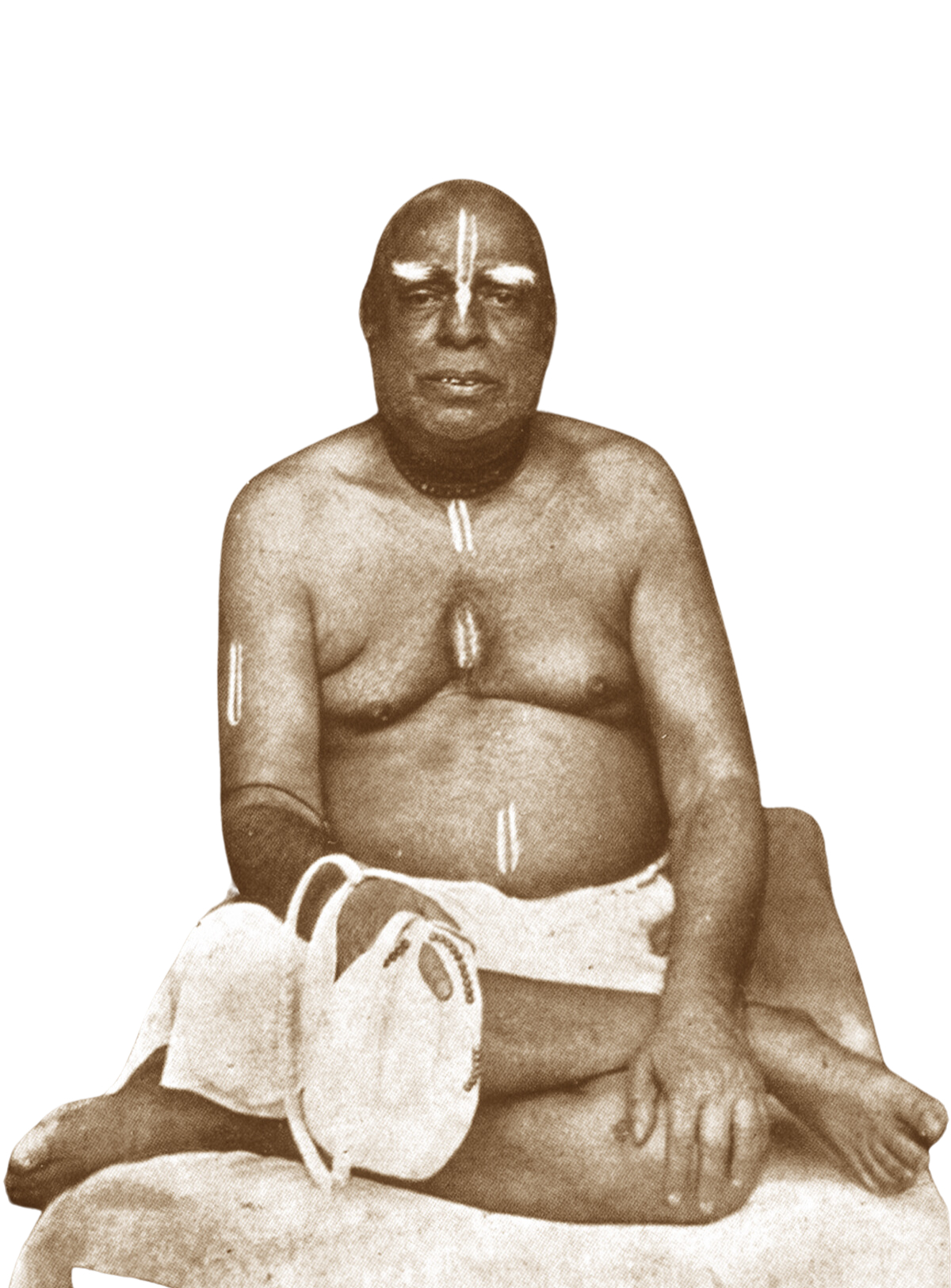 for the sake of Their happy reunion”]
for the sake of Their happy reunion”]
Śrīla Bhaktivinoda Ṭhākura is weeping as he writes, ‘When Rādhikā laments in divyonmāda, in the transcendental madness of separation from Kṛṣṇa she displayed in Brahmara-gīta (Rādhikā speaking with a bumblebee) and at other times, I cannot bear it. I don’t want Kṛṣṇa to leave Rādhikā. He should always remain with Her in Vraja.’ He continues, ‘I cannot tolerate the separation of Rādhikā for Kṛṣṇa, but I can easily and happily give up my life if that will help to bring Kṛṣṇa to Her.’ This is the mood of the pālyadāsīs of Rādhikā.
Then, in another song, called Vṛṣabhānu-sutā, Śrīla Bhaktivinoda Ṭhākura writes:
rādhā-pakṣa chāḍi, je jana se jana,
je bhāve se bhāve thāke
āmi ta rādhikā, pakṣa-pātī sadā,
kabhu nāhi heri tāke
[“I am always in Rādhikā’s entourage and I never even glance upon the faces of those who leave Her, no matter who they are or what their mood is.”]
In other words, he is saying, ‘If someone thinks that the separation mood of Śrīmatī Rādhikā is very good, I don’t want to see that person’s face! It would be a sinful act to see the face of such a person!’
Only Mathurāvāsīs, only those who are not able to appreciate vraja-līlā, like Akrūra and Kaṁsa, will want Rādhikā and Kṛṣṇa to be separated. A rūpānuga Vaisnava understands that everyone in Vraja is acting in such a way as to increase the happiness of Śrī Śrī Rādhā and Kṛṣṇa. Uddhava went to Vraja, realized the separation of the gopīs to a certain extent, and then returned to Kṛṣṇa and said, ‘You must go at once; otherwise, if You do not go, Nanda and Yaśodā, all the gopīs, and all the cows and calves will soon be dead. You must go there.’ Even Baladeva and Rohiṇī-maiyā told Kṛṣṇa, ‘Why don’t you go to Vraja? All will die if You do not go.’ Baladeva told Him, ‘If You do not go there, then I must go; and I will tell them that You are coming very soon.’ Thus, all the Vrajavāsīs want Kṛṣṇa to be with the gopīs and with His father and mother in Vraja.
If vipralambha is higher than meeting, then Lalitā and the other sakhīs and mañjarīs would have been trying to keep Kṛṣṇa out of Vraja. They would have tried to be very far away from Him. But have they done this? They can never do so. Do you want this? Do any of you want Kṛṣṇa to be separated from Rādhikā? Do you want Rādhikā to weep and roll on the ground?
Lalitā once sent a swan to Mathurā. When she sent him off, she told him, ‘Go and tell Kṛṣṇa about the daśamī-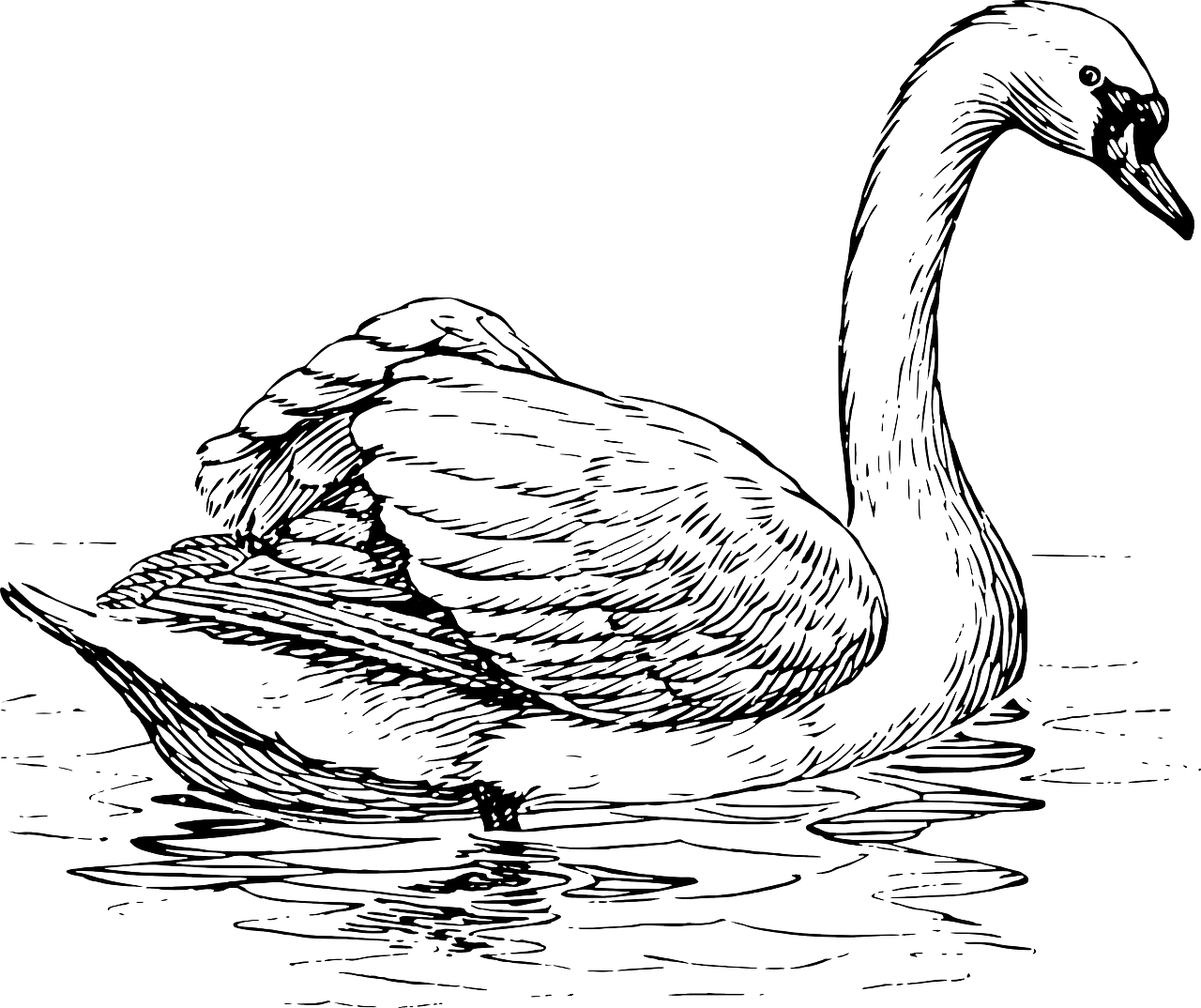 daśa, the tenth stage, of Rādhikā’s condition. In the eleventh stage she would surely die. Nowadays she is often unconscious, and she engages like a mad person in a variety of crazy talks (divyonmāda). Go and tell Kṛṣṇa, ‘You must come in a day, or just now. Otherwise, if you go to Vraja later, You will not be able to meet with Rādhikā at all. You should always keep this in mind. If You want to be happy, and if You want to make all others happy, then come here at once.’
daśa, the tenth stage, of Rādhikā’s condition. In the eleventh stage she would surely die. Nowadays she is often unconscious, and she engages like a mad person in a variety of crazy talks (divyonmāda). Go and tell Kṛṣṇa, ‘You must come in a day, or just now. Otherwise, if you go to Vraja later, You will not be able to meet with Rādhikā at all. You should always keep this in mind. If You want to be happy, and if You want to make all others happy, then come here at once.’
Thus, according to the explanations of our previous ācāryas, what I have told is correct. Vipralambha is only needed to help nourish meeting. If this is not accomplished there is no necessity of vipralambha. It is stated in Śrī Ujjvala-nīlamaṇi, ‘na vinā vipralambhena sambhogaḥ puṣṭim aśnute – without vipralambha, meeting will not be nourished.’
Does meeting come first or does vipralambha come first? If the gopīs had not met with Kṛṣṇa, how would they have experienced vipralambha? First there is meeting, and then separation. Without meeting, the mood of separation cannot come and Śrīmatī Rādhārāṇī cannot weep for Kṛṣṇa. Why are you not weeping? Can you weep for Kṛṣṇa from the core of your heart? You cannot – because you have never seen Him. If you see His beauty, qualities, affection, love and mercy, then you can cry for Him. So first is meeting, sambhoga, then separation in the middle, and then meeting again. There are four kinds of separation, and they are pūrva-rāga, māna, pravāsa and prema-vaicittya.
‘vipralambha’ catur-vidha — pūrva-rāga, māna
pravāsākhya, āra prema-vaicittya-ākhyāna
(Śrī Caitanya-caritāmṛta, Madhya-līlā 23.63)
[“Vipralambha has four divisions — pūrva-rāga, māna, pravāsa and prema-vaicittya.”]
When Kṛṣṇa goes to the forest, the gopīs feel separation. They weep for Kṛṣṇa and discuss among themselves 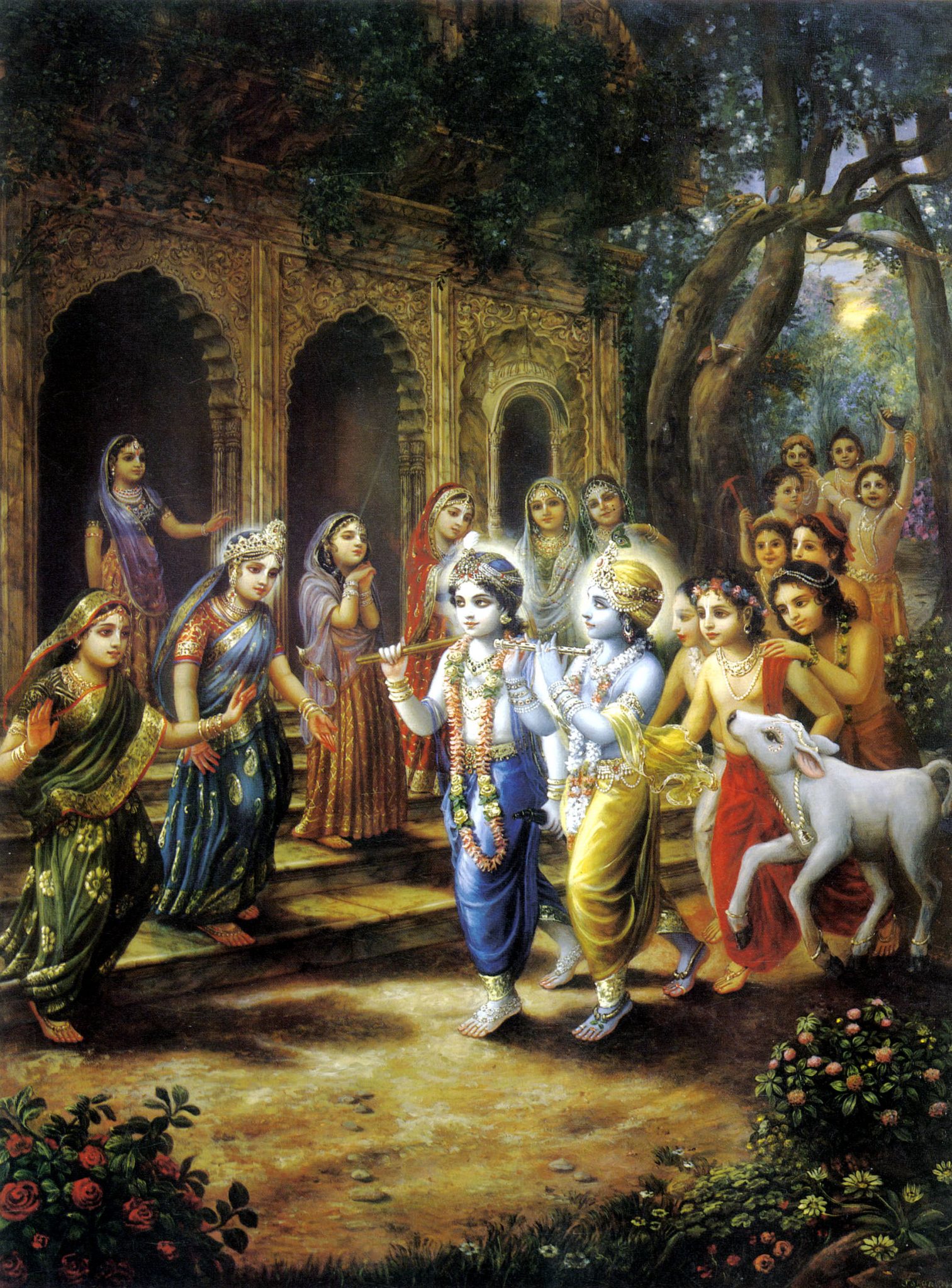 His pastimes in the forest. The ultimate stage of conjugal love is mādanākhya-mahābhāva, which is present only in Rādhikā. All varieties of the moods of meeting and separation reside in mādhanākhya, and this is the monopoly of Śrīmatī Rādhikā. This wonderful mood of Rādhikā is such that even the highest moods of separation are enclosed in it. This mood cannot occur at the time of separation; it occurs only in meeting. It occurs, for example, when Rādhikā is sitting on the lap of Kṛṣṇa at Prema-sarovara. Imagining that Kṛṣṇa has left and will never return, Rādhikā laments, ‘Where is Kṛṣṇa?’ This is very wonderful and tasteful.
His pastimes in the forest. The ultimate stage of conjugal love is mādanākhya-mahābhāva, which is present only in Rādhikā. All varieties of the moods of meeting and separation reside in mādhanākhya, and this is the monopoly of Śrīmatī Rādhikā. This wonderful mood of Rādhikā is such that even the highest moods of separation are enclosed in it. This mood cannot occur at the time of separation; it occurs only in meeting. It occurs, for example, when Rādhikā is sitting on the lap of Kṛṣṇa at Prema-sarovara. Imagining that Kṛṣṇa has left and will never return, Rādhikā laments, ‘Where is Kṛṣṇa?’ This is very wonderful and tasteful.
We should try to know all these truths, and that understanding will reconcile all the statements of your Śrīla Prabhupāda.
Śyāmarāṇī dāsī: In case someone has any doubt and thinks that our Śrīla Prabhupāda considers separation higher than meeting, they can look in his books and see the many quotes confirming exactly what Śrīla Gurudeva (Śrīla Bhaktivedānta Nārāyaṇa Mahārāja) has said tonight.*[See Endnote 1]
Śrīla Bhaktivedānta Nārāyaṇa Mahārāja: I very humbly request those who have doubts to discuss with me this very deep subject. I welcome them, and I think that by such discussion, reconciliation will come.
Jagadhātrī dāsī: I don’t know philosophy and I’m not a scholar, but I remember that in the Kṛṣṇa book Kṛṣṇa told the gopīs, ‘I have never left you.’ So the gopīs are in the mood of separation, but actually Kṛṣṇa never left them.
Śrīla Bhaktivedānta Nārāyaṇa Mahārāja: If He never left, then why were the gopīs always lamenting and suffering due to Him? The idea that Kṛṣṇa never left, that He is everywhere, and therefore there was no need for the gopīs to lament is the version of Uddhava. This was not the version of the gopīs. Rather, the gopīs defeated all of Uddhava’s arguments.
I know that your Prabhupāda is a philosopher and a rasika-bhakta as well. He realizes both vipralambha and 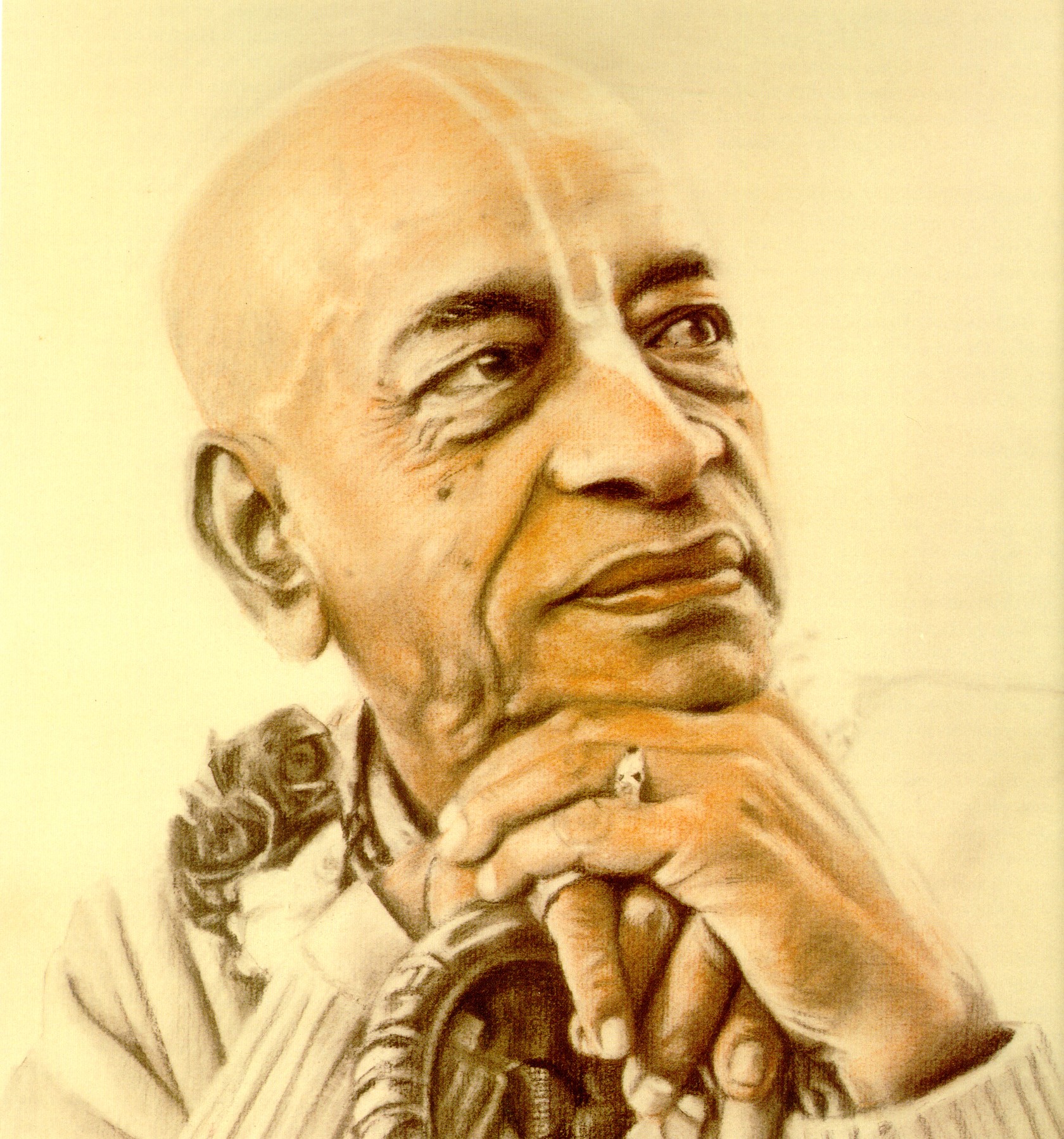 sambhoga. Like his predecessor ācāryas, he is a servant of Śrīmatī Rādhikā. Will he say that Rādhā should always be far away from Kṛṣṇa? Never. I know him. I have been with him since 1947, and I am still serving him. If he has written, on a rare occasion, that separation is higher than meeting, he has done this only for beginners. We must feel separation for Kṛṣṇa, and we must lament that we have been separated from Him for a long time. It is essential for a sādhaka to feel that he is separated from Kṛṣṇa, and thus he should lament in separation.**[See Endnote 2] On the other hand, for the mature devotee, Śrīla Svāmī Mahārāja has written in his many books that separation is only accepted if it helps increase the enjoyment of meeting.
sambhoga. Like his predecessor ācāryas, he is a servant of Śrīmatī Rādhikā. Will he say that Rādhā should always be far away from Kṛṣṇa? Never. I know him. I have been with him since 1947, and I am still serving him. If he has written, on a rare occasion, that separation is higher than meeting, he has done this only for beginners. We must feel separation for Kṛṣṇa, and we must lament that we have been separated from Him for a long time. It is essential for a sādhaka to feel that he is separated from Kṛṣṇa, and thus he should lament in separation.**[See Endnote 2] On the other hand, for the mature devotee, Śrīla Svāmī Mahārāja has written in his many books that separation is only accepted if it helps increase the enjoyment of meeting.
Now kindly digest all these truths.
(The next morning, at a darśana)
All the sakhās (cowherd boys) also used to feel great separation from Kṛṣṇa. Even when Kṛṣṇa would hide behind a tree, they used to run very quickly to find him; and the gopīs especially used to experience grievous separation. It has been written in Śrīmad-Bhagavatam’s Gopī-gīta:
aṭati yad bhavān ahni kānanaṁ
truṭi yugāyate tvām apaśyatām
kuṭila-kuntalaṁ śrī-mukhaṁ ca te
jaḍa udīkṣatāṁ pakṣma-kṛd dṛśām
(Śrīmad-Bhāgavatam 10.31.15)
[“When You go off to the forest during the day, a tiny fraction of a second becomes like a millennium for us because we cannot see You. And even when we can eagerly look upon Your beautiful face, so lovely with its adornment of curly locks, our pleasure is hindered by our eyelids, which were fashioned by the foolish creator.”]
The meaning is clear. When Kṛṣṇa used to go for cow grazing, and also when He returned from cow grazing, the gopīs used to see Him. At that time they wanted a way to be free from the impediment of the eyelids covering their eyes. They wanted thousands of eyes without eyelids – all over their bodies – because they wanted to see Kṛṣṇa unimpeded. They cursed the creator, ‘O Brahmā, because of the blinking of the eyelids that were created by you, our vision of Kṛṣṇa is disturbed. We cannot tolerate separation from Kṛṣṇa for even a fraction of a second. Each fraction of a second seems to us to be thousands and thousands of yugas.’ How would the Vrajavāsīs be able to tolerate the suffering of gopīs, and especially of Rādhikā?
(The next night, during class)
It was only for beginners and sādhakas that parama-pūjyāpada Bhaktivedānta Svāmī Mahārāja said that one must adopt the mood of separation. We have been forgetful of Kṛṣṇa since the beginning of time. Thus, a sādhaka–bhakta should always lament, weep and feel separation in his bhajana. He should weep like Śrī Caitanya Mahāprabhu, like Śrīla Narottama dāsa Ṭhākura, and like Śrīla Bhaktivinoda Ṭhākura. Beginners must know that we have forgotten Kṛṣṇa and we have been separated from Him from time immemorial, and therefore their bhajana should be full of feelings of separation.
The mature devotees will also feel separation, but moreover they will not want Śrīmatī Rādhikā to feel separation from Kṛṣṇa.
aṭati yad bhavān ahni kānanaṁ
truṭi yugāyate tvām apaśyatām
kuṭila-kuntalaṁ śrī-mukhaṁ ca te
jaḍa udīkṣatāṁ pakṣma-kṛd dṛśām
(Śrīmad-Bhāgavatam 10.31.15)
[“When You go off to the forest during the day, a tiny fraction of a second becomes like a millennium for us because we cannot see You. And even when we can eagerly look upon Your beautiful face, so lovely with its adornment of curly locks, our pleasure is hindered by our eyelids, which were fashioned by the foolish creator.”]
The gopīs criticized Brahmā thus: ‘You don’t know how to create. You have made us with only two eyes, and you have also given us eyelids that continue to blink. You don’t know anything. If any new Brahmā comes and follows our instructions, he will make thousands and thousands of eyes throughout our limbs without lids. At that time we will vividly see Kṛṣṇa when He comes home from grazing cows in the evening and when He leaves again in the morning. At present, however, we eagerly wait for Kṛṣṇa to return throughout the day. Then, when He comes home and we try to see Him, two things obstruct our vision. One obstruction is the tears that fall from our eyes, and second, we have eyelids. When Kṛṣṇa is in front of us, if for a second we cannot see Him because of our tears or our eyelids, that second seems as long as thousands and millions of yugas (millenniums). We feel great separation at this time.’
If you want the gopīs to always be separated because this is higher, then what will become of them? They will die very soon. If you are happy to make them die, then you can say that the mood of separation is higher. If I ask those who have written that paper which tries to prove that separation is higher, ‘Do you want Rādhā and Kṛṣṇa to always be separated and to always feel separation?’ I think they will not answer in the affirmative. Only one who has no bhakti at all can say, ‘Yes’ to this.
The highly respected Śrīla Kavi-karṇapūra is an exalted devotee. When he was very young he sucked the toe of 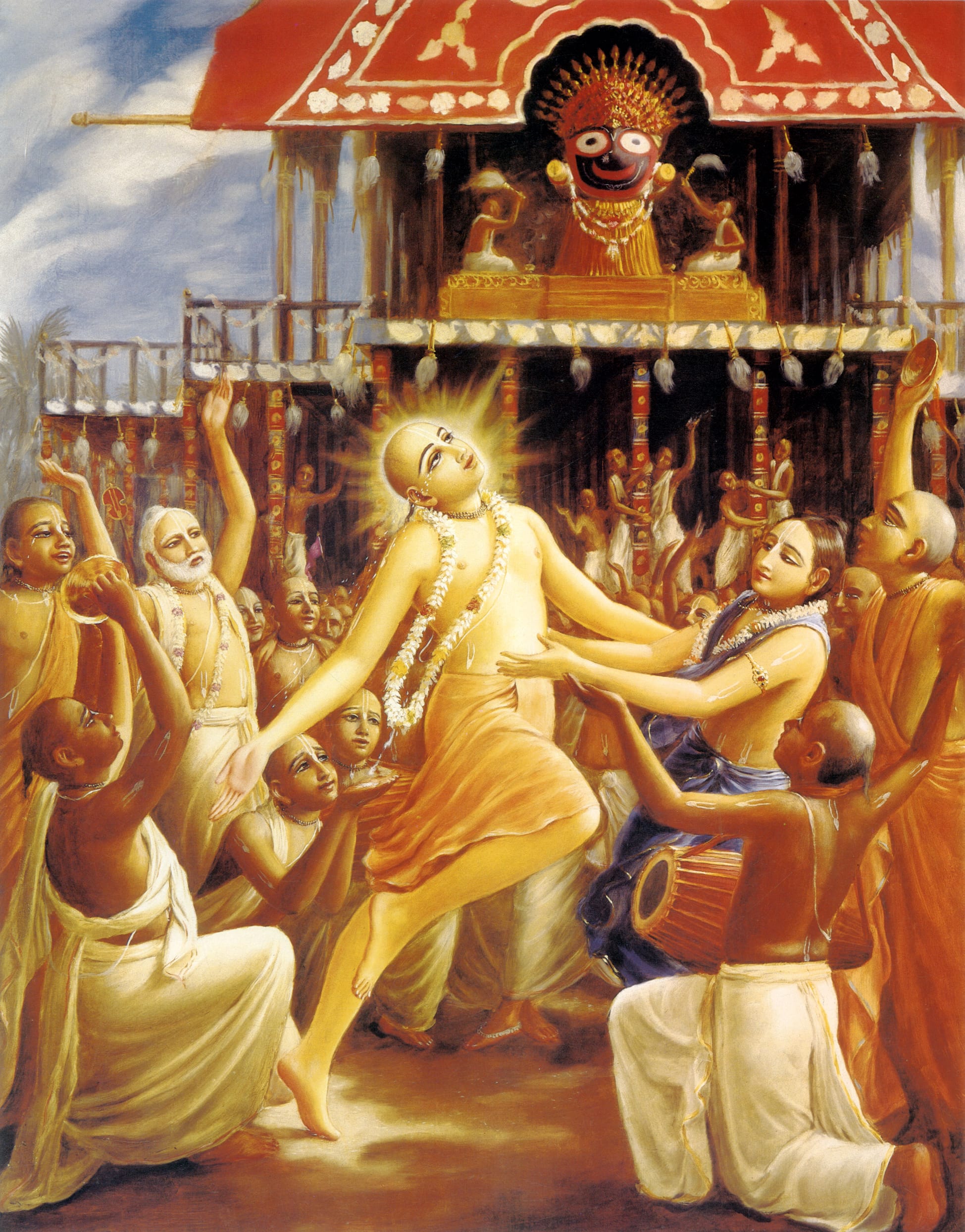 Śrī Caitanya Mahāprabhu, and by that act he became one of the greatest Vaiṣṇava poets and writers. He has written a famous book called Śrī Ānanda-vṛndāvana-campū, which is similar to Śrī Gopāla-campū of Śrīla Jīva Gosvāmī, and he is more senior than Jīva Gosvāmī in the sense that he met with Śrī Caitanya Mahāprabhu before Jīva Gosvāmī did. He wrote about the activities of Kṛṣṇa up to rāsa-līlā, holi-līlā, the swinging pastimes and so on, and he never described how Kṛṣṇa went with Baladeva to Mathurā and how He sent Uddhava to Vraja. He never told this because he could not tolerate the thought of separation between Rādhā and Kṛṣṇa. He thinks that if Kṛṣṇa will leave his svāminījī Rādhikā and go to Mathurā, Rādhikā will die. In Vraja, when Kṛṣṇa used to go to the forest for cow grazing, the gopīs hardly felt any separation in comparison to what they felt when Kṛṣṇa left for Mathurā. When Kṛṣṇa left for cow grazing, groups of gopīs used to assemble to sing Gopī-gīta and Veṇu-gīta, and thus they maintained their lives. We should be happy about the meeting of Rādhā and Kṛṣṇa, and we should be sad about Their separation. Śrīla Bhaktivinoda Ṭhākura has therefore written:
Śrī Caitanya Mahāprabhu, and by that act he became one of the greatest Vaiṣṇava poets and writers. He has written a famous book called Śrī Ānanda-vṛndāvana-campū, which is similar to Śrī Gopāla-campū of Śrīla Jīva Gosvāmī, and he is more senior than Jīva Gosvāmī in the sense that he met with Śrī Caitanya Mahāprabhu before Jīva Gosvāmī did. He wrote about the activities of Kṛṣṇa up to rāsa-līlā, holi-līlā, the swinging pastimes and so on, and he never described how Kṛṣṇa went with Baladeva to Mathurā and how He sent Uddhava to Vraja. He never told this because he could not tolerate the thought of separation between Rādhā and Kṛṣṇa. He thinks that if Kṛṣṇa will leave his svāminījī Rādhikā and go to Mathurā, Rādhikā will die. In Vraja, when Kṛṣṇa used to go to the forest for cow grazing, the gopīs hardly felt any separation in comparison to what they felt when Kṛṣṇa left for Mathurā. When Kṛṣṇa left for cow grazing, groups of gopīs used to assemble to sing Gopī-gīta and Veṇu-gīta, and thus they maintained their lives. We should be happy about the meeting of Rādhā and Kṛṣṇa, and we should be sad about Their separation. Śrīla Bhaktivinoda Ṭhākura has therefore written:
śrī kṛṣṇa-virahe, rādhikāra daśā, āmi tô’ sahite nāri
ĵugala-milana, sukhera kāraṇa, jīvana chāḓite pāri (1)
Śrī Kṛṣṇa-virahe, verse 1
[“I cannot tolerate Rādhikā’s condition in separation from Śrī Kṛṣṇa. Thus I am fully prepared to give up my life for the sake of Their happy reunion.”]
rādhikāra tare, śata-bāra mari, se duḥkha āmāra saya (2)
Śrī Kṛṣṇa-virahe, verse 2
[“For Rādhikā’s sake, I would tolerate the agony of death hundreds of times.”]
‘If I see Rādhikā feeling separation, I will die in anguish hundreds and thousands of times over. On the other hand, I can do anything for Rādhikā’s pleasure. For Her pleasure, I will happily die hundreds and hundreds of times.’
This is the essence of all our discussion of yesterday.

An excerpt from the book Śrī Vraja-maṇḍala Parikramā, Second Edition
Once, Rādhā and Kṛṣṇa, surrounded by Lalitā and the other sakhīs, were immersed in various kinds of loving pastimes when a bumblebee hovered around the beautiful lotus face of Śrīmatī Rādhikā. Thinking Her face to be a lotus flower, the bee wanted to sit there and drink its nectar; so it continued to hover around Her face. Śrīmatījī  became afraid and covered Her face with Her palms. She also tried to chase the bee away but to no avail. Madhumaṅgala saw Śrīmatī Rādhikā ’s distress and chased the bumblebee far away with his stick. Upon his return, he announced, “I have chased madhusūdana far away from here. He has gone and will not return.” When Śrīmatī Rādhikā heard Madhumaṅgala’s words, She at once thought that Madhusūdana Kṛṣṇa had gone away and had left Her, although She was sitting directly in Kṛṣṇa’s lap. She began to lament, deeply afflicted by separation from Him. She could not, at that instant, understand that madhusūdana also means “bumblebee”. She wept and repeatedly cried out, “Oh, Prāṇanātha, where have You gone? Oh, Lord of My life, where have You gone?”
became afraid and covered Her face with Her palms. She also tried to chase the bee away but to no avail. Madhumaṅgala saw Śrīmatī Rādhikā ’s distress and chased the bumblebee far away with his stick. Upon his return, he announced, “I have chased madhusūdana far away from here. He has gone and will not return.” When Śrīmatī Rādhikā heard Madhumaṅgala’s words, She at once thought that Madhusūdana Kṛṣṇa had gone away and had left Her, although She was sitting directly in Kṛṣṇa’s lap. She began to lament, deeply afflicted by separation from Him. She could not, at that instant, understand that madhusūdana also means “bumblebee”. She wept and repeatedly cried out, “Oh, Prāṇanātha, where have You gone? Oh, Lord of My life, where have You gone?”
Upon seeing these amazing transcendental sentiments known as prema-vaicittya, in His beloved Rādhikā, Kṛṣṇa also forgot that She was sitting on His lap. He too wept and cried, “O My beloved!” and They both fainted. The tears that flowed from Their eyes and the perspiration that poured from Their bodies created this pond. When the sakhīs saw Their condition, they too became senseless. Śrīmatī ’s female parrot began to loudly chant Śrī Rādhā ’s name, and the male parrot began to loudly chant Śrī Kṛṣṇa’s name. As They heard each other’s name, Rādhā and Kṛṣṇa regained external consciousness and gazed upon each other with great yearning. Gradually, the sakhīs also regained consciousness and in boundless bliss began to call out, “Jaya, jaya!” The poet Śrī Mādhurījī describes this pastime in a very charming way.
After this incident, Śrī Kṛṣṇa thought to Himself, “Although I remain close by My beloved Śrīmatī Rādhikā, I am unable to pacify the suffering She experiences in separation from Me. The heat of impending separation 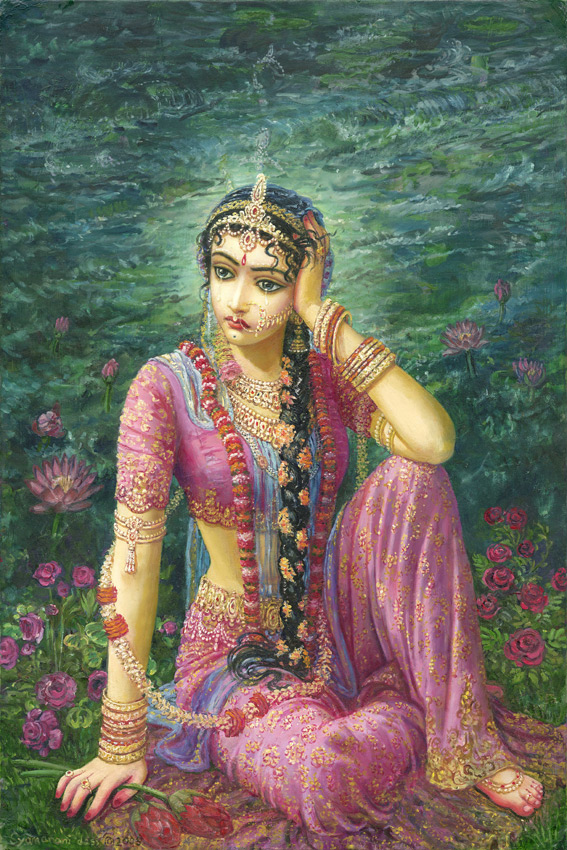 constantly scorches Her, and I see no means to console Her. When I am far away from Her, She constantly thinks of Me out of separation from Me. She becomes so absorbed in transcendental emotions that She laughingly talks to tamāla trees, thinking them to be Me, and plays with Her sakhīs. And sometimes She displays māna. In contrast, when I am close to Her, She is overwhelmed by a feeling of separation from Me, and She becomes distressed and cries. In this condition, I cannot console Her, even if I am right beside Her.
constantly scorches Her, and I see no means to console Her. When I am far away from Her, She constantly thinks of Me out of separation from Me. She becomes so absorbed in transcendental emotions that She laughingly talks to tamāla trees, thinking them to be Me, and plays with Her sakhīs. And sometimes She displays māna. In contrast, when I am close to Her, She is overwhelmed by a feeling of separation from Me, and She becomes distressed and cries. In this condition, I cannot console Her, even if I am right beside Her.
“Thus, Śrī Rādhā can only be consoled when I am far away from Her. In this state of separation, Her fire of separation can be somewhat pacified upon having an internal transcendental vision (sphūrti ) of Me or beholding objects like the tamāla tree that possesses a lustre similar to My own. This is because She actually considers them to be Me, Her dear most beloved.” Thinking in this way, Kṛṣṇa secretly decided to leave for a distant place. This is the main reason why He left Vṛndāvana to go to Mathurā and Dvārakā.
The transcendental sentiment that Śrīmatī Rādhikā displays here is the topmost mādana-bhāva, which is found only in Her. It does not manifest even in Lalitā and the other sakhīs. In this mādana-bhāva, feelings of separation (vipralambha) and meeting (sambhoga), as well as all other mutually opposed bhāvas, are present simultaneously in an astonishing way.
 An excerpt from a morning walk with Śrīla Bhaktivedānta Nārāyaṇa Mahārāja in Badger, California, on June 11, 2010, published in Walking with a Saint – Morning Walks and Conversations 2010
An excerpt from a morning walk with Śrīla Bhaktivedānta Nārāyaṇa Mahārāja in Badger, California, on June 11, 2010, published in Walking with a Saint – Morning Walks and Conversations 2010
Vrajanātha dāsa: Prabhu is asking about what you explained in Hawaii some years ago, that sambhoga (the 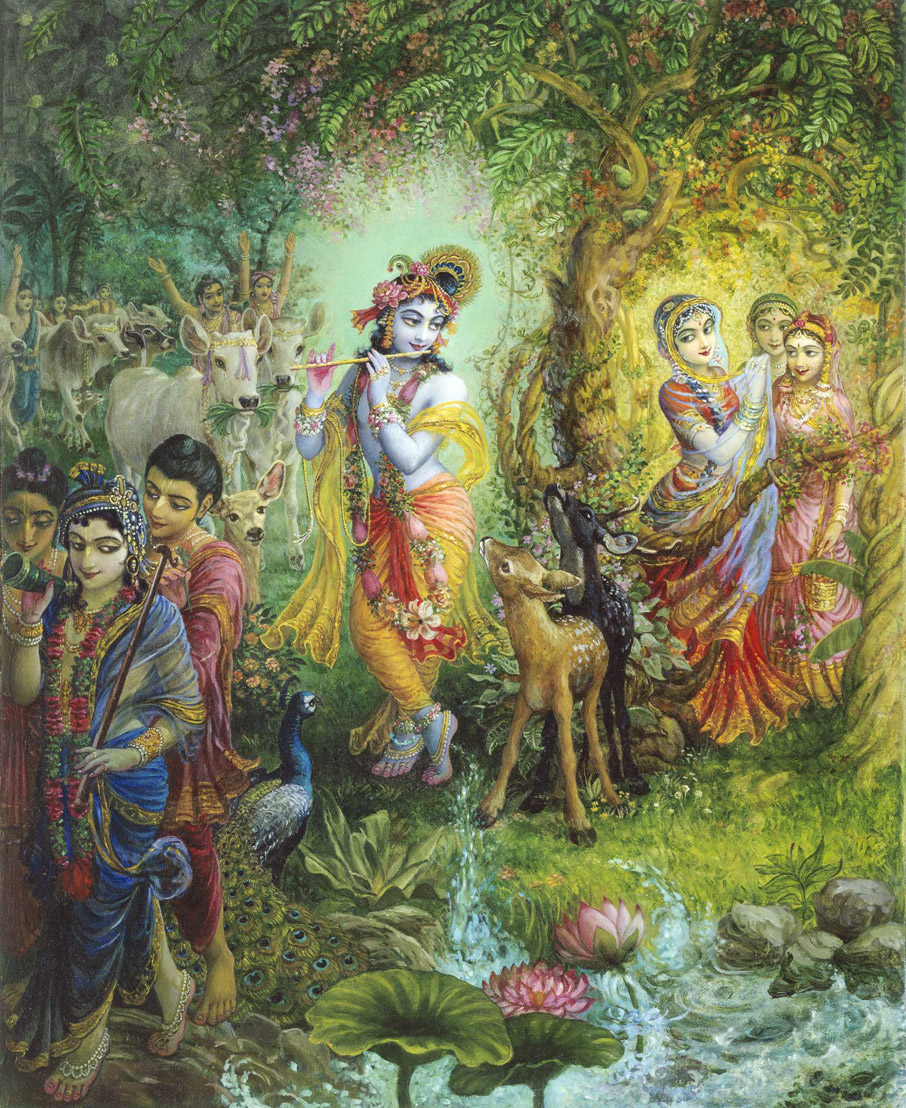 pastimes of Kṛṣṇa and His associates in meeting) is higher than vipralambha (the pastimes in the mood of separation).
pastimes of Kṛṣṇa and His associates in meeting) is higher than vipralambha (the pastimes in the mood of separation).
Śrīla Bhaktivedānta Nārāyaṇa Mahārāja: I have also sometimes told that vipralambha dances on the head of sambhoga. But, do any of you want the separation of Rādhā and Kṛṣṇa?
Devotees: No.
Śrīla Bhaktivedānta Nārāyaṇa Mahārāja: Do any of you want this?
Devotees: No, never.
Śrīla Bhaktivedānta Nārāyaṇa Mahārāja: So, which is greater?
Devotees: Sambhoga.
Śrīla Bhaktivedānta Nārāyaṇa Mahārāja: Yet, Kṛṣṇa wants everyone in the world to know that Rādhikā’s love for Him is superior to anyone else’s love – not only in meeting, but also in separation.
*Endnote 1: “When the lover and the beloved meet, they are called yukta (connected). Previous to their meeting, they are called ayukta (not connected). Whether connected or not connected, the ecstatic emotion arising due to not being able to embrace and kiss each other as desired is called vipralambha. This vipralambha helps nourish emotions at the time of meeting.” (Purport to Śrī Caitanya-caritāmṛta, Madhya-līlā 23.62)
“On the sambhoga platform the ecstasies are unlimited, and on the vipralambha platform they are four in number. The ecstasy exhibited before the lover and beloved meet, the ecstasy experienced between them after meeting, the state of mind experienced by not meeting, and the state of mind experienced after meeting but fearing separation are called vipralambha. That vipralambha serves as a nourishing element for future meetings.” (Teachings of Lord Caitanya)
**Endnote 2: “Lord Caitanya taught people in general the method of vipralambha-sevā, which is the method of rendering service unto the Supreme Personality of Godhead in the feeling of separation. The Six Gosvāmīs also taught worship of Kṛṣṇa in the feeling of the gopīs in separation. The prayers composed by Śrīnivāsācārya about the Gosvāmīs explain these matters very clearly.” (Kṛṣṇa Book, Chapter 47)
“So for advanced devotee everything is possible, as described by this gentleman. But that is not for everyone. That is not a common thing. Exceptional. For the common person, as Caitanya Mahāprabhu has advised and as He has practically shown in His life, that is devotional service in separation: “Where is Kṛṣṇa?” Śūnyāyitaṁ jagat sarvaṁ govinda-viraheṇa me [Śikṣāṣṭaka 7]: “I am seeing everything vacant because I cannot see Kṛṣṇa.” The same thing was followed by the Gosvāmīs.” (Śrīla Prabhupāda’s Śrīmad-Bhāgavatam lecture in Hyderabad on April 10, 1975)
“Our this Gauḍīya-sampradāya, Caitanya Mahāprabhu’s, Caitanya Mahāprabhu’s descendants, our line of God-realization is that separation, feeling of separation. Not that we have got Kṛṣṇa within our hand. No. The feeling of separation, worship of Kṛṣṇa by feeling of separation, is better than the worship by directly meeting. Vipralambha-sevā.” (Śrīla Prabhupāda’s Śrī Caitanya-caritāmṛta lecture in Los Angeles on February 2, 1968)
“Śrī Caitanya Mahāprabhu taught us this method of worship in separation, vipralambha-sevā. Not that “Oh, I have seen yesterday. Last night, I have seen Kṛṣṇa. He was snatching my cloth.” These are sahajiyās. Actually, our worship should be in separation.
The Gosvāmīs also taught us like that.”
…
“Direct contact is not possible. Neither that is the way of worshipping by the method of Śrī Caitanya Mahāprabhu. That is sahajiyā-vāda. “I am talking with Kṛṣṇa. Kṛṣṇa is snatching my cloth.” There is a book, one lady has written her experience, that Kṛṣṇa comes, He talks with her and snatches her cloth. She has written openly. But this is not Caitanya Mahāprabhu’s way.
…
“Real Caitanya Mahāprabhu sampradāya is that he should be feeling like Caitanya Mahāprabhu, separation. Not sambhoga. Vipralambha. Vipralambha-sevā: “Oh, I am so wretched, I could not serve Kṛṣṇa. How I can see Kṛṣṇa? It is not possible.” In this way. That is the teaching of Śrī Caitanya Mahāprabhu. “But even though I do not see Him, neither it is possible for me to see Him…” [This] means: “What I am? I am insignificant person. Why [should] Kṛṣṇa come and see me?” This is right. “Why shall I aspire after seeing Kṛṣṇa? What qualification I have got?” This is bhajana. This is bhajana. Why should I be proud that “Now I shall see Kṛṣṇa”? What I am?
That is the teaching of Caitanya Mahāprabhu...Kṛṣṇa may not come. I may not see Kṛṣṇa for thousands and thousands of lives. I may rot in the hellish condition of life for many, many births. That doesn’t matter. Still, I cannot give up Kṛṣṇa consciousness.” This is required. I may be sent to hell, heaven; it doesn’t matter. What qualification I have got that I want to see back to home, back to Godhead? It is not so easy thing.” (Śrīla Prabhupāda’s Śrīmad-Bhāgavatam lecture in Māyāpura on June 27, 1973)
Source: Purebhakti.com
Image(s) made possible by Pixabay.com, Krishnapath.org and/or Bhaktiart.net
Unless indicated differently, all verse translations and quotes are from the books/lectures by Śrīla Prabhupāda (Vedabase.com/Prabhupadavani.org)
[ad_2]
#Meeting #higher #Separation







